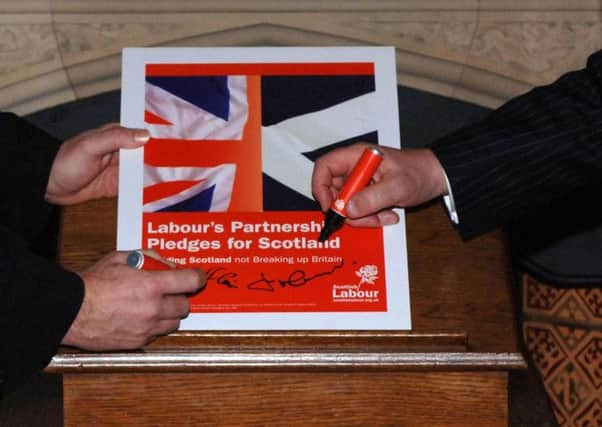Mike Elrick: Labour must show passion for Union


There are four months until the independence referendum. To be exact, there are four months and eight days until the vote to decide Scotland’s future in, or out of, the United Kingdom.
That’s only 18 weeks left for those who believe that Scotland is better off in the UK to convince the Scottish electorate of their case.
Advertisement
Hide AdAdvertisement
Hide AdI still think, when it comes down to it, that Scots will vote to remain in the Union, but the efforts of the No campaign will probably not be the reason why they vote to stay in the UK.
As a former political strategist, I recognise it was always going to be difficult to run a disciplined and focused political campaign bringing together the three main Westminster parties with different political agendas, against a determined, well-financed and well-organised media-savvy opponent with a simple argument.
I am surprised, nevertheless, at how the Better Together campaign has lost its way in the past six months and allowed the perception to take hold that the political initiative is with the Yes camp.
In recent months, the No campaign has appeared at times to lack direction and, above all, one key ingredient – passion.
Whatever the faults of the Better Together campaign, and regardless of what happens on 18 September and any inquests other parties have, I believe the Labour Party has to take a long, hard look at how it has approached the referendum campaign, and learn from it.
Labour has a special responsibility – it was the party under the leadership of John Smith that pledged to create a Scottish parliament, it was the party in government under Tony Blair that legislated for it 17 years ago, and it was the senior governing party in the new parliament for eight years.
It was Labour that initiated the Calman process, which resulted in greater tax and borrowing powers for Holyrood through the Scotland Act 2012, and most recently, through its own Devolution Commission, has promised new powers for the parliament.
So Labour has much to be proud of when it comes to the devolution settlement. Yet the party has been slow, in my view, not just to champion its achievements in delivering effective “home rule” but to defend the “settled will” of devolution against those who seek to break Scotland from the rest of the UK.
Advertisement
Hide AdAdvertisement
Hide AdPerhaps the party was spoiled: for years it had heavyweight politicians of the calibre of Smith, Donald Dewar and Robin Cook to powerfully make the case for devolved government. They’re gone.
But surely the current able generation of Labour politicians at Westminster and Holyrood can defend the devolution settlement with enthusiasm, energy and fervour, regardless of the sensitivities of a cross-party campaign?
Scotland’s future, and that of the devolution settlement, is at stake in four months’ time – I want to see Labour politicians fight for Smith and Dewar’s legacy with a passion and intensity which I haven’t seen yet.
Labour’s involvement in the referendum campaign to date has been far too muted and low-key. It’s not as if Labour and the other UK parties haven’t had the time to rehearse the case for why Scotland should remain in the UK. Nor should the Yes campaign’s tactics come as a surprise.
Alex Salmond announced the date of the referendum more than a year ago – but the parties have known that a referendum would take place from the moment he was re-elected as First Minister in May 2011 – three years ago next week.
Back in January 2012, Labour leader Ed Miliband said: “Labour is going to show in the campaign that we will go toe to toe with Alex Salmond on the issues of who can create a fairer Scotland, who can create a Scotland that is better for the working people of Scotland.” Two years on, I can’t, hand on heart, say it’s worked out that way. Yes, Labour’s shadow cabinet has met in Glasgow, and there have been visits – like yesterday’s – by Ed Miliband. Yes, Scottish Labour set up its own Devolution Commission and last year its own referendum campaigning offshoot United with Labour, with its own website and much talk of building “a new moral economy” and bringing about “a revolution in social policy”, whatever that may mean.
And it’s true, in recent months, party “big beasts” Gordon Brown, George Robertson and John Reid have weighed in with cogent arguments for retaining Scotland’s place in the Union, but their involvement has been intermittent and doesn’t appear to be part of a concerted strategy to deploy the party’s big hitters. It does beg the question: why weren’t they involved from the very beginning?
OK, Labour is not in government and understandably has one eye on the General Election in a year’s time, but it appears to this observer that Labour has been happy to take a back seat to the efforts of coalition ministers and Better Together to make the case for Scotland in the UK, assuming it will all work out in September and the real battle will be defeating the Tories in 2015.
Advertisement
Hide AdAdvertisement
Hide AdScots are about to make the biggest decision affecting this nation for 300 years. There remains a good story to tell about how Scotland benefits as part of the UK, why devolution has been a huge success and why Scots should stick with it.
Come September, whether Scotland stays or leaves the Union will be decided not by the quality of the respective campaigns on both sides of the argument, but by the people.
With only four months left before the big vote, I hope Labour, and especially Scottish Labour, seizes the opportunity, moves centre stage and shows it is up for the fight – a party that is passionate about devolution and Scotland’s place in the United Kingdom.